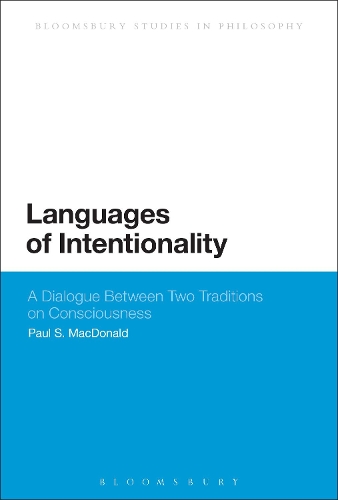
Languages of Intentionality: A Dialogue Between Two Traditions on Consciousness
(Paperback)
Available Formats
Publishing Details
Languages of Intentionality: A Dialogue Between Two Traditions on Consciousness
By (Author) Professor Paul S. MacDonald
Bloomsbury Publishing PLC
Bloomsbury Academic
16th January 2014
United Kingdom
Classifications
Professional and Scholarly
Non Fiction
Phenomenology and Existentialism
128.2
Physical Properties
Paperback
240
Width 156mm, Height 234mm
278g
Description
Intentionality - the relationship between conscious states and their objects - is one of the most discussed topics in contemporary debates in philosophy of mind, cognitive neuroscience and the study of consciousness. Long a foundational concept in Phenomenology, it has also received considerable coverage in the writings of analytic philosophers. This book is the first study to offer an impartial, well-informed assessment of the two traditions' approaches through an in-depth investigation of the principal thinkers' ideas, so that their positions emerge side-by-side, converging and diverging on certain shared themes. Beginning with a historical discussion of thedevelopment of the term in the work of Continental thinkers in the 19th and early 20th centuries, the book considers the work of Brentano and Husserl and subsequent existentialist critiques. From there, it explores how empirical-analytic philosophers took up the topic, drawn as they were to materialist and computer models of the mind. Finally MacDonald presents a new 'hybrid' account of intentionality that will be a crucial work for scholars working on consciousness and the mind.
Reviews
Paul S. MacDonald has written a beautifully clear, deeply well-informed, and up-to-date critical history of the puzzling but immensely important notion of intentionality. He seamlessly integrates discussion of phenomenological and analytical approaches to the topic, demonstrating their many points of contact. This book will not only be extremely useful to students of philosophy and their teachers as a core text on the subject, but also makes illuminating reading for professional philosophers.' -- E. J. Lowe, Professor of Philosophy at Durham University, UK.
Philosophical analyses of the problems of consciousness, as well as accounts of what the problems are, remains divided between the approaches one finds in analytic-empirical as opposed to continental philosophy.Knowledgeable yet accessible, lively, opinionated and well-argued--those on either side of the divide will find this book useful not only to better understanding the other's positions, but possibly their own as well. More than that, this book is filled with substantive insights that constitute a positive, refreshing, and readable contribution to the study of consciousness.' -- Michael Levine, Professor of Philosophy at The University of Western Australia, Australia.
Author Bio
Paul S. MacDonald is Senior Lecturer in Philosophy at Murdoch University, Australia. He is the author of Descartes and Husserl (SUNY Press, 2000), History of the Concept of Mind (Ashgate, vol.1, 2003; vol. 2, 2006), and the editor of The Existentialist Reader (Routledge, 2001).
